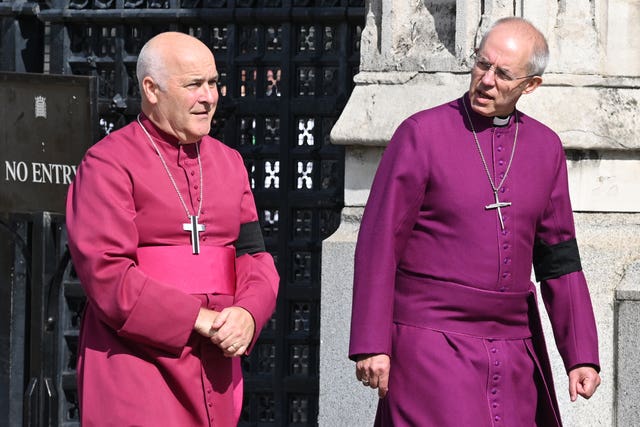Pressure on Archbishop of York Stephen Cottrell has increased after revelations a priest at the centre of a sexual abuse case was twice reappointed under him while he was serving as bishop of Chelmsford.
Mr Cottrell acknowledged things “could have been handled differently” as the crisis at the very top of the Church of England deepened.
But Bishop of Newcastle the Rt Rev Helen-Ann Hartley questioned how Mr Cottrell could have any credibility, and Bishop of Gloucester the Rt Rev Rachel Treweek declined to publicly back him.
Mr Cottrell has already faced calls to resign over his handling of the case of David Tudor, who was banned from ministry for life this year after admitting what the Church of England described as serious sexual abuse involving two girls aged 15 and 16.
I don’t know how you can find a situation ‘horrible and intolerable’ and then square that with what it is reported here ⬇️ Answer is, you can’t and be expected to be a credible voice as the leadership of the Church of England https://t.co/bIfyrJAsE8
— Bishop of Newcastle (@BishopNewcastle) December 22, 2024
Decades earlier, Tudor was suspended from ministry for five years in 1988, having admitted, according to a tribunal document, having sex with a 16-year-old girl he met when she was a pupil at a school where he was chaplain.
But he was later able to return to working in the Church in 1994.
The archbishop said it was “not possible” to remove the priest from office until fresh complaints were made against him in 2019.

However, according to a fresh BBC investigation, Tudor’s contract as area dean in Essex was renewed in both 2013 and 2018.
Mr Cottrell would have known that Tudor had been barred by the Church from being alone with children, had paid compensation to a sex abuse victim and served a five-year ban from being a priest
“On reflection, he acknowledges this could have been handled differently, and regrets that it wasn’t, but his focus throughout his time as bishop of Chelmsford was, with the help of safeguarding professionals, to understand, assess and manage the risk of David Tudor.
“No one advised him that David Tudor should not continue as an area dean.”
The spokeswoman added that “all the risks around David Tudor were regularly reviewed by safeguarding professionals and this was the main focus” and “when further action could be taken in 2019, it was”.
In response to the BBC’s investigation, the Bishop of Newcastle said: “I don’t know how you can find a situation ‘horrible and intolerable’ and then square that with what it is reported here.
“Answer is, you can’t and be expected to be a credible voice as the leadership of the Church of England.”
Pressed on whether she supported the archbishop, she said: “I think there are very important conversation and processes to go on that are not going to take place over public media.
“I want to live process well. I want to live relationship well. It’s where we have failed, so much as the Church, in keeping relationship at the heart of our processes and I want that to run through every aspect of the Church.
“You asked me if it made a difference. I do think there are big questions to be looked at.
“I heard that news with shock and dismay but I want the proper process to take place in order that we shape ourselves as the right sort of church going forward, and that, for me, is the big question.”
The crisis has hit the Church of England in the run-up to Christmas, a crucial time for its public-facing role.
Mr Cottrell is due to take on many of the soon-to-step-down Archbishop of Canterbury’s official functions temporarily from January 6, when Mr Welby quits over failures in the handling of a separate sex abuse case in the Church.
Mr Welby announced last month he would resign, after initially declining to do so, in the wake of the Makin report which concluded John Smyth – the most prolific serial abuser to be associated with the Church – might have been brought to justice had Mr Welby formally reported him to police in 2013.






